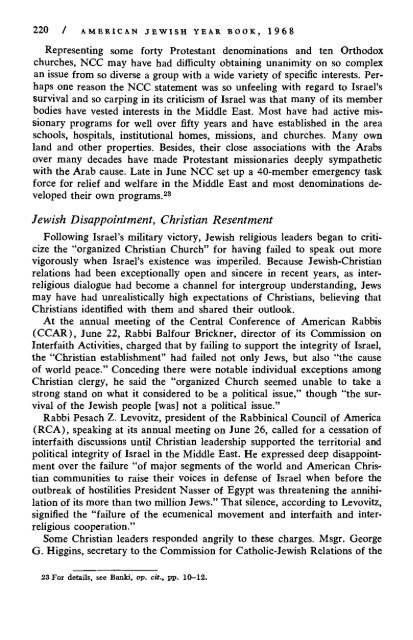1968_4_arabisraelwar
You also want an ePaper? Increase the reach of your titles
YUMPU automatically turns print PDFs into web optimized ePapers that Google loves.
220 / AMERICAN JEWISH YEAR BOOK, <strong>1968</strong><br />
Representing some forty Protestant denominations and ten Orthodox<br />
churches, NCC may have had difficulty obtaining unanimity on so complex<br />
an issue from so diverse a group with a wide variety of specific interests. Perhaps<br />
one reason the NCC statement was so unfeeling with regard to Israel's<br />
survival and so carping in its criticism of Israel was that many of its member<br />
bodies have vested interests in the Middle East. Most have had active missionary<br />
programs for well over fifty years and have established in the area<br />
schools, hospitals, institutional homes, missions, and churches. Many own<br />
land and other properties. Besides, their close associations with the Arabs<br />
over many decades have made Protestant missionaries deeply sympathetic<br />
with the Arab cause. Late in June NCC set up a 40-member emergency task<br />
force for relief and welfare in the Middle East and most denominations developed<br />
their own programs. 23<br />
Jewish Disappointment, Christian Resentment<br />
Following Israel's military victory, Jewish religious leaders began to criticize<br />
the "organized Christian Church" for having failed to speak out more<br />
vigorously when Israel's existence was imperiled. Because Jewish-Christian<br />
relations had been exceptionally open and sincere in recent years, as interreligious<br />
dialogue had become a channel for intergroup understanding, Jews<br />
may have had unrealistically high expectations of Christians, believing that<br />
Christians identified with them and shared their outlook.<br />
At the annual meeting of the Central Conference of American Rabbis<br />
(CCAR), June 22, Rabbi Balfour Brickner, director of its Commission on<br />
Interfaith Activities, charged that by failing to support the integrity of Israel,<br />
the "Christian establishment" had failed not only Jews, but also "the cause<br />
of world peace." Conceding there were notable individual exceptions among<br />
Christian clergy, he said the "organized Church seemed unable to take a<br />
strong stand on what it considered to be a political issue," though "the survival<br />
of the Jewish people [was] not a political issue."<br />
Rabbi Pesach Z. Levovitz, president of the Rabbinical Council of America<br />
(RCA), speaking at its annual meeting on June 26, called for a cessation of<br />
interfaith discussions until Christian leadership supported the territorial and<br />
political integrity of Israel in the Middle East. He expressed deep disappointment<br />
over the failure "of major segments of the world and American Christian<br />
communities to raise their voices in defense of Israel when before the<br />
outbreak of hostilities President Nasser of Egypt was threatening the annihilation<br />
of its more than two million Jews." That silence, according to Levovitz,<br />
signified the "failure of the ecumenical movement and interfaith and interreligious<br />
cooperation."<br />
Some Christian leaders responded angrily to these charges. Msgr. George<br />
G. Higgins, secretary to the Commission for Catholic-Jewish Relations of the<br />
23 For details, see Banki, op. cit., pp. 10-12.


